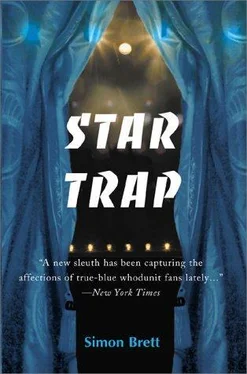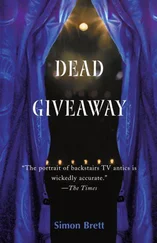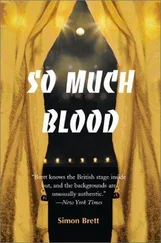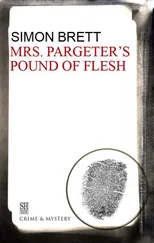Simon Brett - Star Trap
Здесь есть возможность читать онлайн «Simon Brett - Star Trap» весь текст электронной книги совершенно бесплатно (целиком полную версию без сокращений). В некоторых случаях можно слушать аудио, скачать через торрент в формате fb2 и присутствует краткое содержание. Жанр: Классический детектив, на английском языке. Описание произведения, (предисловие) а так же отзывы посетителей доступны на портале библиотеки ЛибКат.
- Название:Star Trap
- Автор:
- Жанр:
- Год:неизвестен
- ISBN:нет данных
- Рейтинг книги:5 / 5. Голосов: 1
-
Избранное:Добавить в избранное
- Отзывы:
-
Ваша оценка:
- 100
- 1
- 2
- 3
- 4
- 5
Star Trap: краткое содержание, описание и аннотация
Предлагаем к чтению аннотацию, описание, краткое содержание или предисловие (зависит от того, что написал сам автор книги «Star Trap»). Если вы не нашли необходимую информацию о книге — напишите в комментариях, мы постараемся отыскать её.
Star Trap — читать онлайн бесплатно полную книгу (весь текст) целиком
Ниже представлен текст книги, разбитый по страницам. Система сохранения места последней прочитанной страницы, позволяет с удобством читать онлайн бесплатно книгу «Star Trap», без необходимости каждый раз заново искать на чём Вы остановились. Поставьте закладку, и сможете в любой момент перейти на страницу, на которой закончили чтение.
Интервал:
Закладка:
‘So?’
‘You’re getting thirty for rehearsal, fifty on tour and eighty for the run.’
‘Oh well, could be worse. Christopher Milton’s in this show. Got any form on him?’ While Maurice Skellern was pretty useless as an agent, he was an invaluable source of theatrical gossip.
‘Nothing much, no. He doesn’t do a lot of work, really.’
‘It’s just that everything he does is massively successful.’
‘Yes, if you look back on his career it’s all award-winning shows. Not a lot, but it’s all been chosen just right.’
‘That’s what having a good agent is about.’
Maurice didn’t seem to notice the edge in the remark. ‘He’s a talented boy, Charles.’
‘Where did he start?’
‘I’m fairly sure he came out of one of the stage schools, but I don’t know which one. Think he may have been a child star in films. Not sure, though.’
‘Know anything of his working reputation?’
‘A bit temperamental, I’ve heard. But that’s third hand. I mean stories like that go around about every big name in the business.’
‘Yes. Is he gay or anything?’
‘No, I don’t think so. Sure not, actually. He married that girl who was in that film… you know.’
‘I’m afraid I don’t.’
‘Oh, the one who played opposite Nigel Thingummy in that… Oh, you know. Name like Elsa or Virginia or — Charlotte Fable, that’s it!’
‘I’ve heard of her. Still together?’
‘No, I think they split up eighteen months or so ago.’
‘Divorce?’
‘Haven’t seen anything about it. No, I shouldn’t think he’d like the publicity. Rather lets down the image of lovability, and that’s what the public expects of him.’
‘Hmm. Oh well, thanks.’
‘If you really want form, ask Johnny Wilson. He worked with him on the telly show.’
‘Oh yes. What’s that called?’
‘Straight Up, Guv. Surely you must have seen it.’
‘No, I haven’t.’
‘Oh, it’s a very funny show, Charles. I never miss it. It’s on tonight at seven-thirty. These are repeats, actually, second time round, or is it third? Think of the money on a show like that. Probably sells round the world. That’s what you need, Charles, a big, long-running television series.’
‘As part of my artistic development?’
‘Of course.’
That evening Charles watched television. He went round to see Jim Waldeman, a fellow actor who lived in Queen’s Gardens with his wife Susie and a fairly new baby. He took a bottle of Bell’s to ensure his welcome, but it was unnecessary. As he entered the door, both Jim and Susie’s eyes lit up and, with a cry of ‘Baby-sitter!’, they installed him in an arm-chair in front of the television and went off to the pictures. ‘Imagine,’ said Susie, ‘actually going to see a film. The excitement. We used to go about twice a week, but since that came along, we just haven’t. At all. Bless you, Charles.’
‘What happens if it — ’
‘Oh, he won’t. He’s terribly good. But if he does, there’s some Phenergan on the dresser. Cheerio.’ And the door slammed.
‘What’s Phenergan?’ asked Charles weakly, but he realised they couldn’t hear. He also realised that the slam of the door had woken the baby.
He switched on the television, determined that the child would soon be asleep again. It was a colour set (Jim’s career was obviously flourishing), but Charles caught the end of an old black and white movie. It was British, some story about a small boy bringing together his estranged parents. The father was an airman and there was a lot of stiff upper lip stuff about one last mission. The boy was a beautiful child, with a perfectly proportioned baby face and blond curls. Charles wondered idly if it was Christopher Milton in his child star days.
It was becoming clear that the baby was not going back to sleep. The keening cry sawed through the noise of the television. Charles looked at his watch. Twenty-five past seven. The crying showed no signs of abating and he didn’t want to miss the beginning of the show. He went into the night-lit nursery and mumbled soothingly over the cot. The screams redoubled in volume. In the sitting-room music built to an heroic conclusion. He picked up the baby in its blanket and returned to the television.
The film credits flashed past. The child star was not Christopher Milton. Gareth Somebody, another who had no doubt vanished without trace to become an accountant or an estate agent or a double glazing salesman. After the film came a trailer for a programme on Northern Ireland to be shown the following night.
The baby was not taking kindly to its move. The little mouth strained open like a goldfish and the pebble eyes almost vanished in folds of skin as it screamed. It was a long time since Charles had held a baby and he had forgotten the little tricks he had used when his own daughter Juliet was small. He tried rocking the little bundle and murmuring the Skye Boat Song. It didn’t work.
On the television screen the credits rolled. Inevitably, ‘CHRISTOPHER MILTON’ came first. Then ‘in STRAIGHT UP, GUV — by WALLY WILSON’. Then ‘with’ the names of a couple of those comedy supports who are never out of work and the inevitable wild studio applause faded into the show proper. (Why do studio audiences always applaud signature tunes and credits? The fact that they clap when nothing has happened casts serious doubts on the credibility of their subsequent reactions.) The episode started; Charles couldn’t hear a word above the baby’s howls.
In desperation he dipped a finger in his Scotch and proffered it to the bellowing mouth. The tiny lips closed round it as if determined to remove the skin. But there was silence.
It didn’t last. After a few moments the suction was released and the bellowing recommenced. Charles hastily dipped his finger back in the glass and the mouth clamped on again. By repeating the process every two minutes he found he could watch Straight Up, Guv in comparative comfort.
It was not bad. The show was built around the adventures of a second-rate con-man Lionel Wilkins (played of course by Christopher Milton), whose attempts to pull off the big coup were always crowned with disaster. Wally Wilson’s script was workmanlike, but uninspired; it was Christopher Milton’s performance which raised it above the ordinary. Lionel Wilkins was a genuine comic creation, whose doomed cockiness was strangely engaging. He was the original Wobbly Man; every time you pushed him over, he bounced back up again. As catastrophe followed catastrophe and his face crumpled into crestfallen embarrassment, the audience roared. Each time he picked himself up with some new incongruous scheme and the audience roared again. Even Charles found himself laughing out loud at times. Christopher Milton’s face in repose was unremarkable, but in the character it seemed capable of infinite comic variation. It was easy to see why the show had become a cult.
And, like many cult shows, it had a catch-phrase. As the worst reversal hit him, Lionel Wilkins paused in horror, the audience laughed in anticipation, and then, with perfect timing, he said, ‘I beg yours?’ As Charles heard it, he recognised it, recognised it from shouting schoolboys in the street, giggling secretaries in the tube and half-heard impressionists on the radio. ‘I beg yours?’ was Christopher Milton; he said it and the entire nation followed him.
When Jim and Susie returned, Charles and the baby were still watching television, and between them they’d got through half the bottle of Bell’s.
CHAPTER THREE
The Welsh Dragon Club near the Elephant and Castle had been built in more elegant times as a meeting-place for expatriate Welshmen of the upper and middle classes. It then boasted four tennis courts (grass), fielded six rugby teams and held very proper dances on Saturdays. The members tended to wear blazers or tweed, they had strong religious principles and, when drunk, broke into mournful song.
Читать дальшеИнтервал:
Закладка:
Похожие книги на «Star Trap»
Представляем Вашему вниманию похожие книги на «Star Trap» списком для выбора. Мы отобрали схожую по названию и смыслу литературу в надежде предоставить читателям больше вариантов отыскать новые, интересные, ещё непрочитанные произведения.
Обсуждение, отзывы о книге «Star Trap» и просто собственные мнения читателей. Оставьте ваши комментарии, напишите, что Вы думаете о произведении, его смысле или главных героях. Укажите что конкретно понравилось, а что нет, и почему Вы так считаете.












